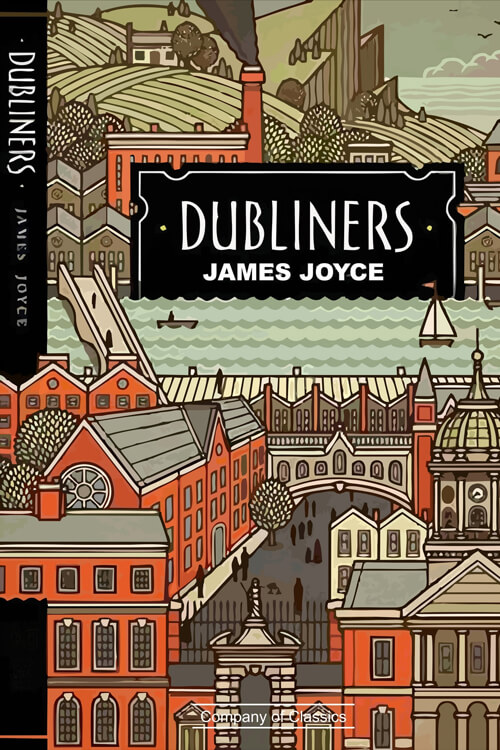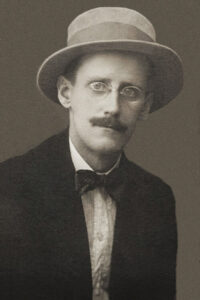
Dubliners
Night after night I had passed the house (it was vacation time) and studied the lighted square of the window: and night after night I had found it lighted in the same way, faintly and evenly. If he was dead, I thought, I would see the reflection of candles on the darkened blind for I knew that two candles must be set at the head of a corpse. He had often said to me: “I am not long for this world,” and I had thought his words idle. Now I knew they were true. Every night as I gazed up at the window I said softly to myself the word paralysis. It had always sounded strangely in my ears, like the word gnomon in the Euclid and the word simony in the Catechism. But now it sounded to me like the name of some maleficent and sinful being. It filled me with fear, and yet I longed to be nearer to it and to look upon its deadly work.
Old Cotter was sitting at the fire, smoking when I came downstairs to supper. While my aunt was ladling out my stirabout he said, as if returning to some former remark of his:
“No, I wouldn’t say he was exactly… but there was something queer… there was something uncanny about him. I’ll tell you my opinion….”
He began to puff at his pipe, no doubt arranging his opinion in his mind. Tiresome old fool! When we knew him first he used to be rather interesting, talking of faints and worms; but I soon grew tired of him and his endless stories about the distillery.
“I have my theory about it,” he said. “I think it was one of those … peculiar cases …. But it’s hard to say….”
He began to puff again at his pipe without giving us his theory. My uncle saw me staring and said to me:
“Well, so your old friend is gone, you’ll be sorry to hear.”
“Who?” said I.
“Father Flynn.”
“Is he dead?”
“Mr. Cotter here has just told us. He was passing by the house.”
I knew that I was under observation so I continued eating as if the news had not interested me. My uncle explained to old Cotter.
“The youngster and he were great friends. The old chap taught him a great deal, mind you, and they say he had a great wish for him.”
“God has mercy on his soul,” said my aunt piously.
Old Cotter looked at me for a while. I felt that his little beady black eyes were examining me but I would not satisfy him by looking up from my plate. He returned to his pipe and finally spat rudely into the grate.
“I wouldn’t like children of mine,” he said, “to have too much to say to a man like that.”
“How do you mean, Mr. Cotter?” asked my aunt.
“What I mean is,” said old Cotter, “it’s bad for children. My idea is: let a young lad run about and play with young lads of his age and not be… Am I right, Jack?”
Read or download Book
James Joyce
James Augustine Aloysius Joyce (2 February 1882 – 13 January 1941) was an Irish novelist, poet, and literary critic. He contributed to the modernist avant-garde movement and is regarded as one of the most influential and important writers of the 20th century.
Biography.
Joyce’s novel Ulysses (1922) is a landmark in which the episodes of Homer’s Odyssey are paralleled in a variety of literary styles, particularly stream of consciousness. Other well-known works are the short-story collection Dubliners (1914), and the novels A Portrait of the Artist as a Young Man (1916) and Finnegans Wake (1939). His other writings include three books of poetry, a play, letters, and occasional journalism. Joyce was born in Dublin into a middle-class family. He attended the Jesuit Clongowes Wood College in County Kildare, then, briefly, the Christian Brothers–run O’Connell School. Despite the chaotic family life imposed by his father’s unpredictable finances, he excelled at the Jesuit Belvedere College and graduated from University College Dublin in 1902.
In 1904, he met his future wife, Nora Barnacle, and they moved to mainland Europe. He briefly worked in Pula and then moved to Trieste in Austria-Hungary, working as an English instructor. Except for an eight-month stay in Rome working as a correspondence clerk and three visits to Dublin, Joyce resided there until 1915. In Trieste, he published his book of poems Chamber Music, and his short story collection Dubliners, and he began serially publishing A Portrait of the Artist as a Young Man in the English magazine The Egoist. During most of World War I, Joyce lived in Zürich, Switzerland, and worked on Ulysses. After the war, he briefly returned to Trieste and then moved to Paris in 1920, which became his primary residence until 1940. Ulysses was first published in Paris in 1922, but its publication in the United Kingdom and the United States was prohibited because of its perceived obscenity. Copies were smuggled into both countries and pirated versions were printed until the mid-1930s, when publication finally became legal. Joyce started his next major work, Finnegans Wake, in 1923, publishing it sixteen years later in 1939. Between these years, Joyce traveled widely. He and Nora were married in a civil ceremony in London in 1931. He made some trips to Switzerland, frequently seeking treatment for his increasingly severe eye problems and psychological help for his daughter, Lucia. When France was occupied by Germany during World War II, Joyce moved back to Zürich in 1940. He died there in 1941 after surgery for a perforated ulcer, less than one month before his 59th birthday. Ulysses frequently ranks high in lists of great books of literature, and the academic literature analyzing his work is extensive and ongoing. Many writers, filmmakers, and other artists have been influenced by his stylistic innovations, such as his meticulous attention to detail, use of interior monologue, and wordplay, and the radical transformation of traditional plot and character development.
Though most of his adult life was spent abroad, his fictional universe centers on Dublin and is largely populated by characters who closely resemble family members, enemies, and friends from his time there. Ulysses in particular is set in the streets and alleyways of the city. Joyce is quoted as saying, “For myself, I always write about Dublin, because if I can get to the heart of Dublin I can get to the heart of all the cities of the world. In the particular is contained the universal.”






